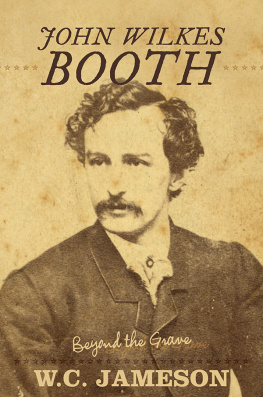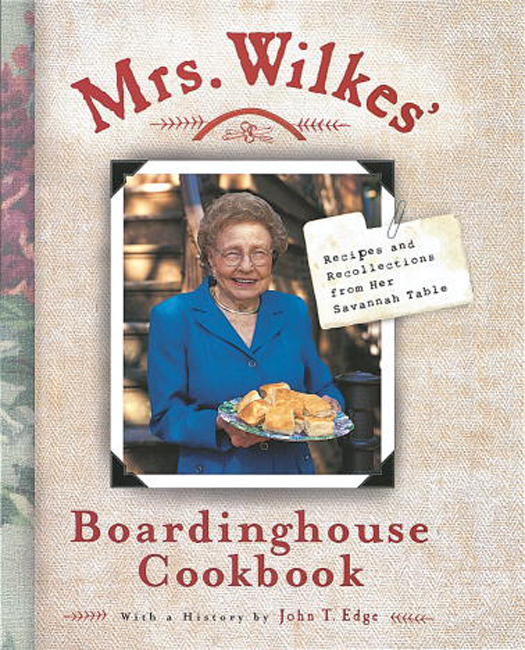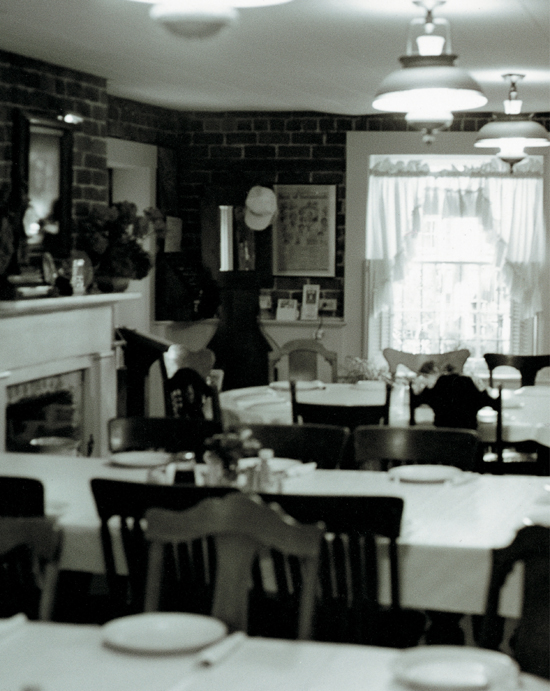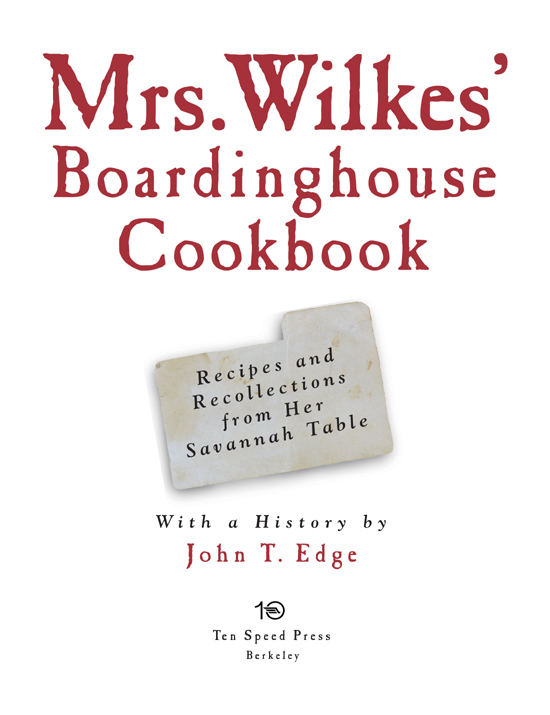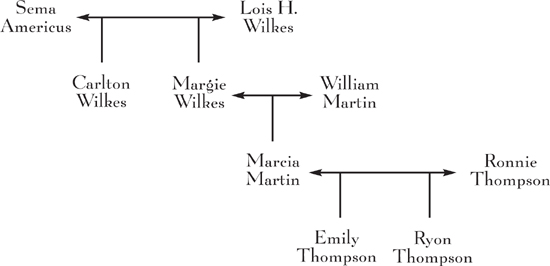Copyright 2001 by Marcia Thompson and Sema Wilkes
All rights reserved. Published in the United States by Ten Speed Press, an imprint of the Crown Publishing Group, a division of Random House, Inc., New York.
www.crownpublishing.com
www.tenspeed.com
Ten Speed Press and the Ten Speed Press colophon are registered trademarks of Random House, Inc.

This is a Design Press book
Design Press is a division of the Savannah College of Art and Design
Library of Congress Cataloging-in-Publication Data
Wilkes, Sema.
Mrs. Wilkes Boardinghouse cookbook : recipes and recollections from her Savannah tables / with a history by John T. Edge.
p.cm.
Includes index.
1. Cookery, AmericanSouthern style. I. Edge, John T. II. Mrs. Wilkes Boardinghouse (Restaurant) III. Title.
TX715.2.S68 W48 2001
641.5975dc21
eISBN: 978-0-307-80773-1
Cover design by Janice Shay and Winslett Long
Copyediting by Cameron Spencer and Elizabeth Hudson-Goff
Research, development, and recipe testing by Marcia Thompson and Carole Scott
: from The Dictionary of American Food and Drink (William Morrow, 1994)
: from Craig Claibornes A Feast Made for Laughter (Henry Holt & Company, 1983)
: from Celestial Navigation (Alfred Knopf, 1974)
Principal food photography by Deborah Whitlaw:
Additional photography by Zola Delburn:
Archival photographs by the Georgia Historical Society, Cordray - Foltz Collection:
Photograph by Savannah College of Art and Design; Star Kotowski:
Esquire, November 1970:
Atlanta Journal-Constitution photo by Billy Downs, September 15, 1975:
Photograph by Cam Dorsey Adams:
Photograph by Kristin Despatric:
V & J Duncan Antique Maps and Prints, Savannah, Georgia:
Photograph by Bruce Feiler:
Photograph by Savannah College of Art and Design; Chia Chong:
v3.1
Contents

We dedicate this book to all the friends and customers whom it has been our pleasure to know and serve throughout these past sixty years and, especially, to our Mr. L. H. Wilkes, Papa, who is greatly loved and missed.
Preface

An Appreciation
T here was a time not too long past when, if asked where to dine in the South, the first words to come spilling from my mouth were not Mrs. Wilkes Boardinghouse in Savannah, Georgia. Over the course of the past year, I have spent many happy hours at Mrs. Wilkes table and, as a result, have come to appreciate the error of my ways.
How jaded was my palate, how blind was I to history, that I had not recognized Mrs. Wilkes for what it is: perhaps the Souths most venerable family restaurant, a modern-day reliquary of old-fashioned country cookery, where the tables groan beneath the weight of a midday repast and history stands still on the plate for all to admire.
Just this day, I sat down to a feast of fried chicken sheathed in a soft, blonde crust flecked with black pepper, butterbeans swimming in potlikker, sweet creamed corn, ropy stewed okra, dusky collard greens, soft whorls of mashed sweet potatoes brightened with raisins, and bone-white biscuits that cleave in two with the slightest prod. In total, thirteen bowls of vegetables and three platters of meats blanketed the oilcloth-clad table, not to mention two baskets of coarse cornbread. As for the other seven tables, they too were crowded with food, and surrounded by intent eaters. To slake my thirst, I drank sweet tea from tall, sweaty glasses. For dessert, they passed monkey bowls full of sunshine-yellow banana pudding, studded with vanilla wafers, and I ate my fill.
It is a typical summer afternoon on West Jones Street, a wide brick boulevard lined with regal, redbrick townhouses and somber, nineteenth-century brownstones framed by filigrees of wrought iron. Moss hangs from the gnarled boughs of the live oak trees that span the street, swirling in the breeze like silvery tinsel bleached a dull gray by the sun. A line of hungry customers snakes back from the front door of the dining room along the ancient brick sidewalk. Though neon-hued nasturtiums bloom in the window boxes, and honeysuckle climbs the fence by the lane, their scents are lost in a savory fog that spirals upward from the kitchen chimney, smelling of country-cured ham and sweet stewed cabbage.
Inside, four generations of the Wilkes family work the ground-floor, brick and wainscot-walled dining room at 107 West Jones. Home from college for the summer, Emily and Ryon Thompson, the great-grandchildren of family matriarch Sema Wilkes, pour tea and greet customers. Their father, Ronnie, works the phones, ordering corn by the bushel and okra by the crate, all the while keeping up a steady banter with the kitchen staff. Ronnies wife, Marcia, granddaughter of Mrs. Wilkes, stops in to lend a hand during the lunch rush. Her father, Bill Martin, works the cash register, while her mother, Margie, perches on a ladder-back chair, poring over the accounting ledgers.
Thats Mrs. Wilkes over by the oak bureau, a cupcake of a woman, her face framed by a poof of gray curls. At age ninety-four she is the queen of all she surveys, the grande doyenne of Southern dining. And her adoring customers know it. Like supplicants to the altar, they approach, pen in hand, hoping to secure an autograph or glean a recipe. Some came to know Mrs. Wilkes and her restaurant only recently when she was awarded the James Beard Americas Regional Classics Award. Others are regulars who were weaned on her stewed okra, reared on her meatloaf and mashed potatoes.
At age ninety-four she is the queen of all she surveys, the grande doyenne of Southern dining.
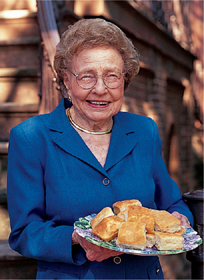
She smiles at all, winks at some, gives a pinch on the elbow to a precious few, and avoids questions with grace and good humor. Ask her how her little dining room came to be known internationally, how she came to fry chicken in Belgium and bake biscuits in Japan, how she came to be celebrated as the Julia Child of country cooking, and shell fix you with a slight, engaging smile and say, without a trace of irony, One came and told another; it happened like that. Ask her the secret to the biscuits that Craig Claiborne once praised as one of the greatest things, ever, to happen in my life, and shell say, The recipe is in my cookbook. How many would you like? Tell her that her dining room has inspired a new generation of restaurant chefs and served as a sort of living history museum of Southern cookery for legions of vacationing outlanders, and shell ask, Would you like some more chicken, maybe another biscuit?



